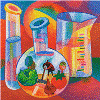Chemical and Biomolecular Engineering, Department of: Papers in Subdisciplines

Papers in Biotechnology
Date of this Version
January 2000
Abstract
This study evaluates the chromatographic performance of a support obtained by the reaction of mercaptoethanol with cellulose beads activated with divinyl sulfone. Cellulose beads 500-800 microns (pm) in diameter and with a solids content of 3.5% were selected for this study. A two-step sequence of permeation and reaction was used to install thiophilic sites throughout the cross section of the bead. The distribution of thiophilic sites was visualized by immobilizing fluorescent antibodies. Human and porcine serum proteins were separated on the thiophilic support at different linear velocities. Thiophilic cellulose beads were observed to bind human and porcine immunoglobulins (IgG) selectively from serum. Overall total protein recoveries in the range of 85%-99% were obtained with human serum, porcine serum and cell supernatant. Human TgG yields of 75% and 50% were obtained at linear velocities of 1 cmlmin and 3 cmlmin, respectively. Thiophilic cellulose beads were observed to bind monoclonal antibodies from cell culture supematant but yields in the range of 40-508 were obtained. Purity of the products, obtained from a single chro~natographics tep, as judged by electrophoretic analysis was estimated to be greater than 80%.


Comments
This article was published in International Journal of Bio Chromatography(2000). Vol 5(I), pp. 31-47 ©2000 OPA (Oversees Publishers Association) Amsterdam N.V. Published by license under the Harwood Academic Publishers imprint, part of the Cordon and Breach Publishing Group. Please contact publisher for the published version.